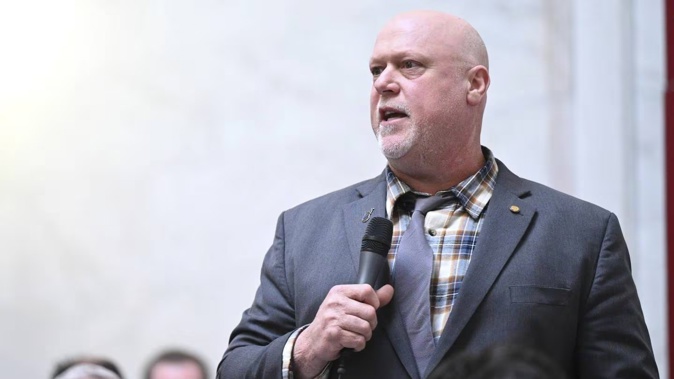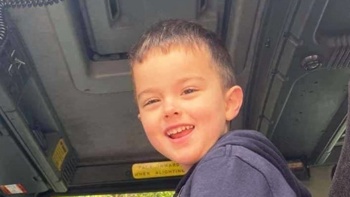
West Virginia’s Republican-controlled House of Delegates voted overwhelmingly on Thursday to allow teachers and other school staff who undergo training to carry guns in K-12 public schools.
The bill, which now heads to the Senate, would allow teachers, administrators and support personnel with concealed carry permits to volunteer to bring a firearm into school with the intention of using it to defend the school in case of an active-shooter event. Designated a “school protection officer”, the staffer wouldn’t receive any additional compensation for doing so.
Supporters say not every school system in West Virginia can afford to hire a full-time school resource officer. This programme would provide another option.
Before the vote, Republican Delegate Dave Foggin of Wood County, a physics teacher, said he can’t think of anything worse than shooting someone in his classroom. But he said if that person came into his school trying to hurt his students, he would do it.
“Evil is a problem. Hate is a problem. I would like to be able to combat hate with love, but unfortunately, it will take a firearm if someone else has one,” Foggin said, before lawmakers greenlit the bill 89-11. Only Democrats voted “no”.
The Senate passed a different piece of legislation, now in the House, last month that would allow county education boards to contract with military veterans and retired law enforcement officers to provide armed security at schools. It’s unclear what chance either bill has of passing in each chamber.
The bill passed by the House is similar to a proposal last year that was approved by one House committee but never made it to the floor. It allowed school districts to opt into the protection officer programme after a public hearing where local citizens could weigh in.
This year’s bill also made the programme optional until lawmakers approved a last-minute change during debate on Thursday requiring school districts to participate if a staffer wants to take on the protection officer role and completes training — something that rankled Democrats and a handful of Republicans who worried local control was being threatened.
Democratic Delegate Joey Garcia said school board members should be able to make up their own minds instead of having the legislature “force-feeding a solution to them”. Republican Delegate Dana Ferrell of Kanawha County, an experienced educator, also urged caution: “If people aren’t happy, they can vote them out,” Ferrell said of school board members.
Republican Delegate Todd Kirby said if the legislature allows the programme to be optional, school boards wouldn’t implement it.
Lawmakers voted down a proposed amendment from a Democrat that would have given school protection officers a one-time payment of US$25,000 ($40,400) after completing training. Although no money has been designated for the programme — that would come when lawmakers finalise the budget before the session’s close in March, if the Senate approves the bill — it contains a fiscal note estimating a cost of US$275,000 for training.
The bill requires that firearms be concealed on campus and that educators have a concealed carry permit. Staffers could also choose to carry a stun gun or a Taser instead of a gun.
The bill requires that staff carrying weapons at school undergo annual behavioural health assessments and training designed by the West Virginia Department of Homeland Security. The bill lays out a list of at least 15 different topics that should be addressed in the training, including crisis intervention, trauma and first aid.
It states that any teacher approved to carry firearms who lets a gun or ammunition out of their “personal control” while on school property may be “removed immediately from the classroom and subject to employment termination proceedings”. The designation of school protection officer can be revoked by the school at any time, according to the bill. Appeals can be made to the director of the state Department of Homeland Security.
The identities of staff members approved to carry a gun would be kept private — and that information would be exempt from public records requests for student safety reasons, according to the bill. The information would be shared with the homeland security department and local law enforcement agencies, however.
Democratic Delegate Kayla Young spoke against the bill, saying it scares her to think there may be guns in her children’s school and that she wouldn’t know where they are and who has them.
“The only thing that stops a bad guy with a gun is a good guy with a gun,” Young said, citing an argument used by the bill’s supporters.
“I’m not sure if I agree with that specifically because if that were the case, the United States would probably be the safest place on Earth,” she said. “But we have more gun violence than anywhere else.”
Lead sponsor Republican Delegate Doug Smith of Mercer County said lawmakers have worked hard to craft a carefully thought-out programme with safeguards so only teachers with the experience and training will be carrying weapons at school.
“It’s crucial that we understand that this bill doesn’t advocate for arming every teacher,” he said. “It’s not the single answer, it’s one important tool.”
Take your Radio, Podcasts and Music with you









